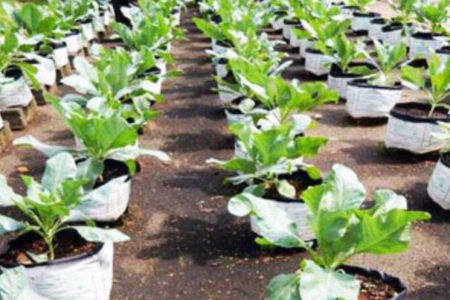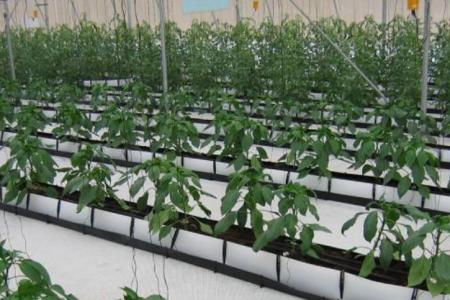Open system
hydroponic systems that involve growing media (container plants) are usually open systems.
The grow bag system in hydroponics is a cultivation method where plants are grown in bags filled with an inert growing medium instead of soil. These grow bags are typically used for larger plants, such as tomatoes, cucumbers, peppers, and strawberries, in both commercial and home hydroponic setups.

The open trough system in hydroponics is a method of growing plants where nutrient-rich water is circulated through open channels or troughs, allowing plant roots to be continuously exposed to the solution. This system is widely used for larger crops like tomatoes, cucumbers, and peppers, but can also support leafy greens and herbs. It’s especially popular in commercial hydroponics because of its efficiency and scalability.

The open trough system in hydroponics is a method of growing plants where nutrient-rich water is circulated through open channels or troughs, allowing plant roots to be continuously exposed to the solution. This system is widely used for larger crops like tomatoes, cucumbers, and peppers, but can also support leafy greens and herbs. It’s especially popular in commercial hydroponics because of its efficiency and scalability.

The grow slab system in hydroponics is a method of growing plants where slabs of an inert growing medium, like rock wool or coco coir, are used to support the plants. The slabs are placed in a controlled environment, often inside grow trays or channels, and nutrient-rich water is delivered directly to the plants’ roots. This system is particularly popular for growing crops like tomatoes, cucumbers, peppers, and other vine plants in commercial hydroponic operations.
Water Analysis
A water analysis is a very important first step for any hydroponic system, regardless of type and size. If the water is to hard (high salt content), a Reverse Osmosis System must be used. A water analysis tests for the following:
Nitrate-Nitrogen, Ammonium-Nitrogen, Phosphate, Potassium, Calcium, Magnesium, Boron, Copper, Iron, Manganese, Molybdenum, Sodium, Sulfate, Fluoride, Chloride, Carbonates, Bicarbonates, pH, EC, Aluminum, Iron, Manganese, Zinc, Copper, Molybdenum, SAR, Alkalinity(mg CaCO3/liter), Total Dissolved Solids (TDS), Hardness